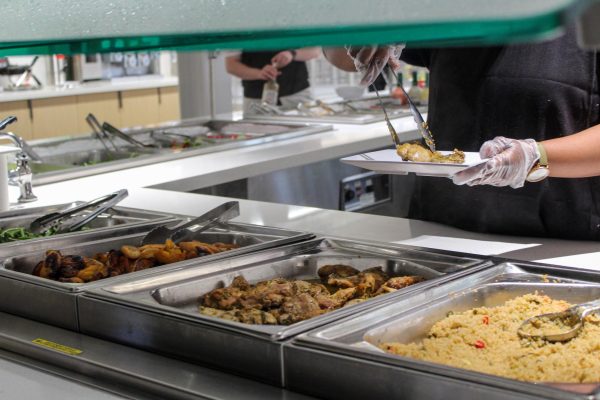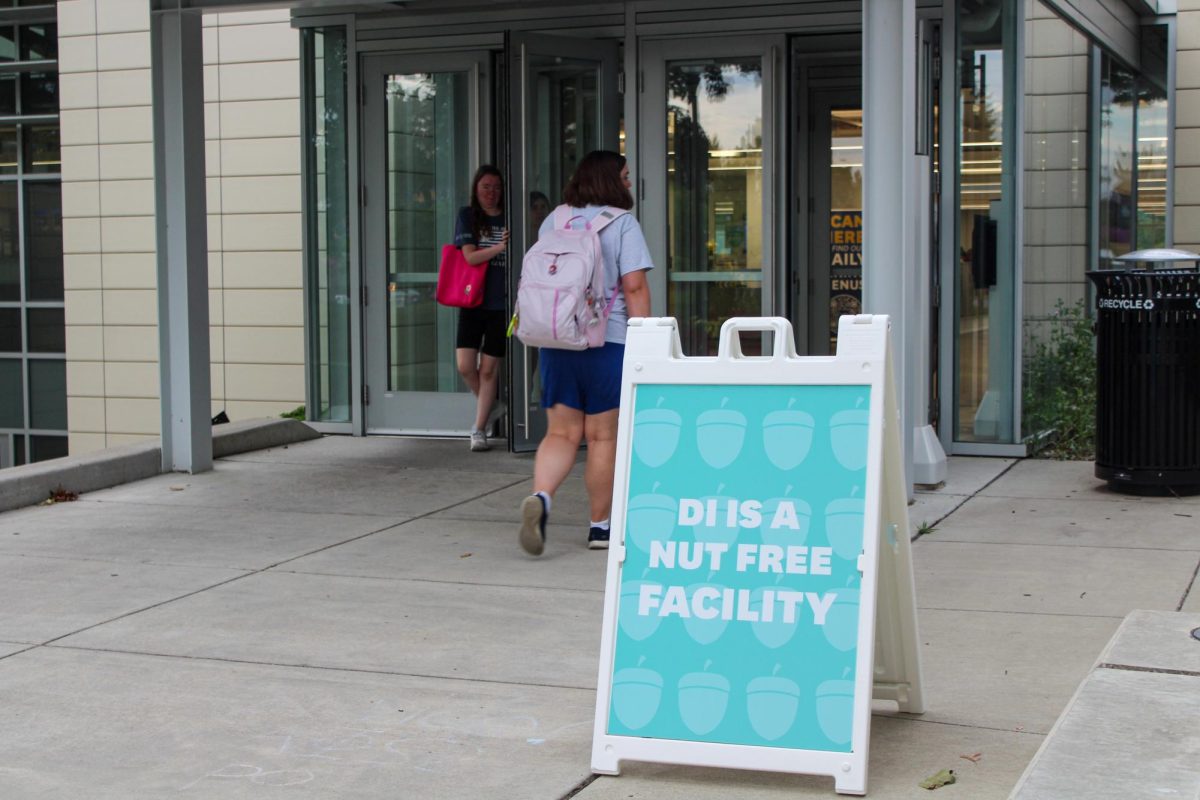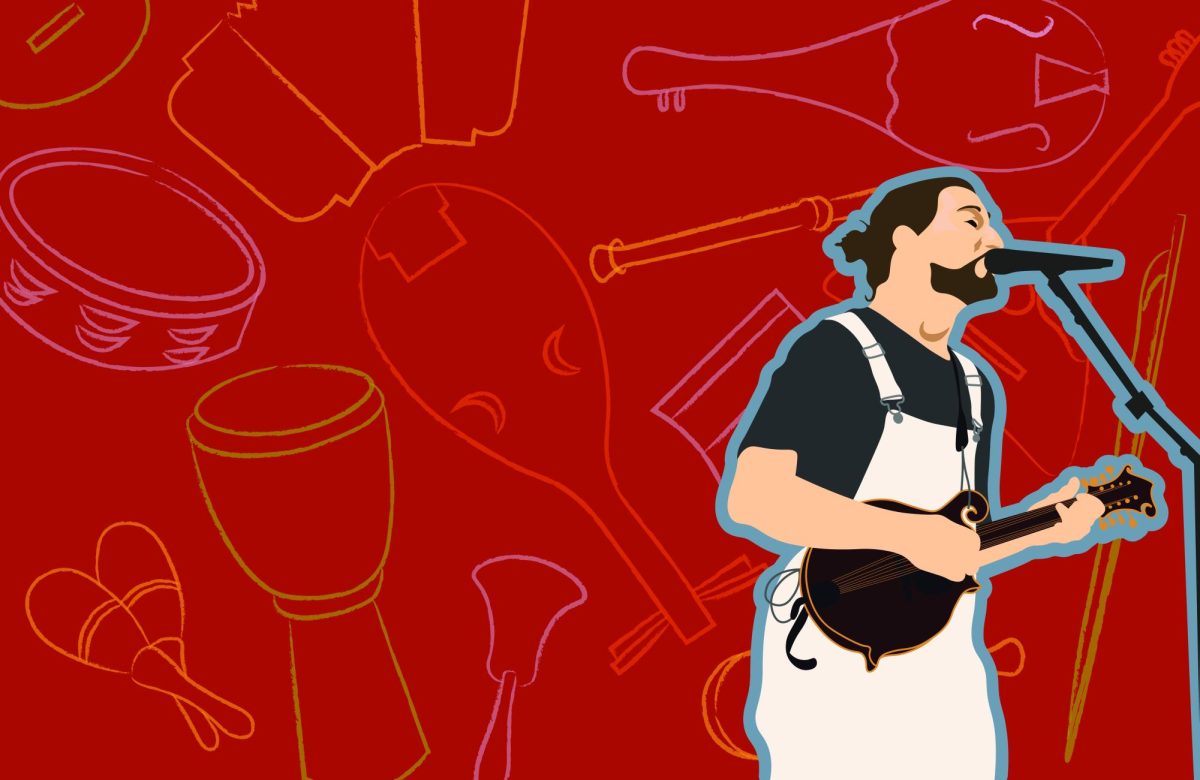The Design Innovation Hub is home to one of the two dining halls on campus and will be a nut-free facility, at the earliest, by January 2024.
The plan to make the DI Hub a nut-free dining facility started last year after collecting survey responses from students, Sarah Korzan, assistant director and dietitian for culinary, said.
“As of last year, we just started collecting information like data on the number of students with all kinds of allergies,” Korzan said.
The results from the survey showed a high number of students with nut allergies, Korzan said.
Campus executive chef Steven Walk said the aerobic nature of nut allergies created another need for the change.
“If you have a person with a nut allergy, they’re in a dining center that using nuts, they can potentially have a reaction just by walking through the facility,” Walk said.

For that reason, Edward Hardin, residential dining chef, said the staff is only able to control the cross-contamination of food inside the building.
“Because we can’t control what goes on outside, we just control what goes on inside so we do extensive cleaning and menu management,” Hardin said.
In addition to the staff knowing the facility is nut-free, they were certificated in allergy training courses, Walk said.
Paying attention to signage throughout the facility and potential exposure to the foods that may include nuts, can minimize cross contamination, Hardin said.
“For outside sources, we just have people basically paying attention, that’s the best we can do with that,” Hardin said.
To minimize outside source concerns, the DI Hub has taken extra steps in keeping the facility clean.
“We have to do testings, swab testings for analysis to make sure there’s no residue on door holds, back of [chairs] or whatever the case may be,” Walk said.
To ensure there is no nut contamination, Korzan and her team were tasked with reviewing product ingredients, she said.
“The heavy-workload has been on [Hardin] and his team. They did all of the cleaning and they still find things sometimes that we have to pull on the daily,” Korzan said. “My small team, me and my student and one other dietitian, have just reviewed products.”
The review process involves avoiding any contamination of classified peanuts and tree nuts by the Food and Drug Administration, which includes hazelnuts, walnuts and coconuts, Korzan said.
For those who drink milk alternatives like coconut milk, the DI Hub provides Uproot milk.
“It’s a soy base, pea base milk and an oat base milk, so we use that to substitute in some of our recipes,” Hardin said.
Hardin and other cooks at DI Hub used Uproot’s oat milk to substitute the use of coconut milk in foods like coconut curry pork, he said.
During the process of becoming a nut-free facility, people expressed to Hardin their want for the cookies to return.
“We still hear a lot of ‘bring cookies back.’ We’re going to get there eventually, it’ll be tough to bake over a thousand cookies,” Hardin said.
The cookies from last year contained ingredients that go against DI’s nut-free goal, and are no longer served, but now they offer nut-free desserts instead, like brownies, cupcakes and sprinkled donuts, Hardin said.
“We have altered our desserts, but that’s okay because that just gives our workers the opportunity to express themselves creatively,” Hardin said.
Amelia Rindfleisch, a sophomore psychology major, said she is allergic to peanuts and most other nuts, and she felt safer eating at the DI Hub with these new changes.
“There’s less to worry about, less cross-contamination,” Rindfleisch said. “It’s much safer when there is one thing removed.”
Besides changing ingredients for recipes, the DI Hub did not switch food providers, but it instead examines how the products are made.
“Ice cream is made in a facility that contains nuts but they start with plain products in the morning and work their way through, and have their (ingredients likely to cause) allergies introduced at the end of the day,” Walk said. “Then they do the proper swabbing and cleaning of the facility.”
After examining how the products are made, Walk and others came together to determine if the production meets their expectations of being nut-free, he said.
“It’s really a team effort because there’s things that we can potentially miss that [Korzan] can pick up, and there’s things that [Korzan] can miss and [Walk] can pick up,” Hardin said. “It has to be a total, complete team effort everyday.”
Regardless of the DI Hub’s recent changes, Hardin said the taste of the food has not changed.
“Just because we are nut-free, that does not mean we do not offer good food,” Hardin said. “We still have good food over here, we’re just a little on the safer side. I do want people to know that, still come try it because they’ll be satisfied.”
Adriana Gasiewski is a staff reporter. Contact her at [email protected].








